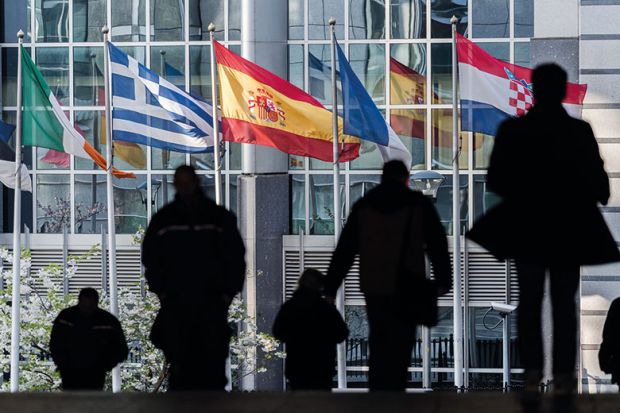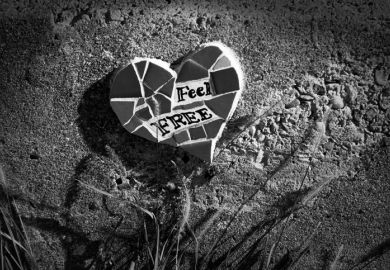The European Union suffers from two sorts of crisis: the familiar kind, involving budgets, trade and late-night deals; and crises that raise the most fundamental questions of political life – survival, solidarity and moral purpose. In this brilliant treatise, beautifully translated from the Dutch by Liz Waters, Luuk van Middelaar claims that the Union has only recently had to face up to the latter, and therefore to engage in real politics. Before the turmoil of the past decade, he argues, the EU – and, in particular, the European Commission – had indulged itself in what Max Weber called the “ethics of conviction”, meaning the sense of rectitude that leads it to sermonise about European values, and in a “logic of promise”, which refers to the integrationist project, bound eventually to reach fruition in a federal state. These two tropes have convinced EU elites that they are on the right side of history.
Unfortunately for such idealism, the EU’s progress has ground to a halt, to the point where its very survival has been called into question – an unthinkable development in the 1990s. Van Middelaar focuses on the four shocks responsible for a loss of confidence: the euro crisis that followed the global financial upheaval of 2007-8; the clash with Russia over the Ukraine from 2014; the escalating migration crisis of 2015; and the blow inflicted by the Brexit vote in 2016. He provides sharp analytical narratives for them all, while his discussion of the high politics of migration is the best thing yet written on the subject. He does not spare the Union in criticising its frequent inability to make hard choices, but he also sees it as having muddled through more or less effectively, usually under German leadership. In the euro crisis, it kept Greece in the monetary system while also imposing a harsh discipline on its people. Over the Ukraine, the Europeans had to face up to the fait accomplis of Russian aggression, falling back on diplomacy in an attempt to prevent further escalation. As for migration, Angela Merkel’s decision to open German borders preserved Europe’s reputation for human decency, but this was soon balanced by pragmatic deals with Turkey and Libya in order to stem the northwards flow. Although the Brexit story remains unfinished, at least the EU has so far preserved its unity, against most expectations.
The picture van Middelaar conjures up is one of the Union bouncing between theatrical gestures and moments of hard-headed realism. Lacking both a stable decision-making system and the systematic capacity to act, it falls back on improvisation. In so far as there is a remedy for its deep-seated problems, the author urges acceptance that Europe is still primarily a community of nation states, coming together to most effect in the European Council of heads of state and government. The Commission’s tendency to see itself as a government in waiting and the Strasbourg Parliament’s pretensions to speak for a European demos should be curbed. The time for technocratic solutions has passed; hard, even tragic, choices now have to be faced.
The author lays bare the various sources of noisy opposition to EU orthodoxy that now rage, although it is curious that he never discusses populism as such. He argues that direct protest and dissent are to be welcomed because they make the differences of democracy visible and thus sharpen our understanding of what needs collective action and what doesn’t. In this he is correct, if only because we have no alternative. The complacency of the integrationists has been shattered. But if the public is now contesting the EU, as it does on trade, migration and austerity, then at least that denotes the arrival of politics proper in Brussels.
Yet a dose of realism about pretensions and institutions is not in itself enough. The Union has outrun its strength through its own advances. The twin projects of enlargement and monetary union have imposed strains that cannot be managed either by consensus within the European Council or by Franco-German leadership – even if Britain’s departure might remove one serious complication. A union of 27 (and potentially more) is inherently unwieldy even before the significant disparities of wealth and culture that now exist are taken into account.
The EU faces two formidable challenges. The first is the need to keep the ship stable in conditions of internal turbulence, which will require institutional reform and more effective management of its common policies – including more prudence over ambitions, so as to keep expectations under control. This will be particularly difficult in three areas: van Middelaar’s prescription for strengthened executive power; the long-foretold creation of an “economic government” for the eurozone; and the crying need for a common asylum and migration policy.
The second major challenge is that of keeping the ship afloat in heavy seas. The EU’s external environment is as testing as at any time over the past 30 years. Not only are Syria and Libya in flames, but the Levant is fragile and relations with Turkey are poor, while North Africa has become a region of volatility. The eastern front of the EU’s near abroad is dominated by Ukraine’s vulnerability and by Vladimir Putin’s apparent wish to divide and rule the 28 whenever possible. In this he is joined by Donald Trump, who has abandoned the enduring US policy of support for the EU.
Yet the main problem is less the storms that are battering the EU than the fact that it is not, and cannot become in the near future, a “ship of state”. It is the much-derided international actor sui generis, becalmed by the lack of enthusiasm for a further constitutional leap forward. It has to manage with what it has, which means falling back on some version of variable geometry, whereby the member states cooperate in a variety of groupings, big and small, highly integrated or loose, with the flexibility for states to opt in or out as they prefer. This approach has long been heresy to the purists of European law, but it is the logic of the system that van Middelaar describes, whereby a cumbersome Union functions only through an uneasy mix of nation state power and institutional compromises.
The average citizen does not grasp this complexity and cannot be expected to. Academics describe it as “multi-level governance”, which is accurate so far as it goes but which also dignifies the process. “Governance” is a term that makes it impossible to see where agency and responsibility lie – two key concepts for a democratic polity. It is understandable that some should seek to clarify matters by proposing changes such as the direct election of an EU president, but even the crises described here have not yet shaken things up to the point where that might be possible. In any case, a president whose decisions could be ignored would make little difference. Institutional reform still has to reckon with the resilience of the nation state and of patriotic feelings. One of the saddest twists of Brexit is that it occurred just at the time when the British view, that the integrationist project had run out of steam, was beginning to hold sway. Even without the UK, the Union will have to face up to this reality.
Christopher Hill is Wilson E. Schmidt professor at SAIS Europe in Bologna, and emeritus professor of international relations at the University of Cambridge. He is also the author of The Future of British Foreign Policy: Security and Diplomacy in a World after Brexit (2019).
Alarums and Excursions: Improvising Politics on the European Stage
By Luuk van Middelaar; translated by Liz Waters
Agenda, 320pp, £25.00
ISBN 9781788211727
Published 28 March 2019
The author
Luuk van Middelaar, professor of European Union law at Leiden University, was born in Eindhoven in the Netherlands but spent his early years in Wageningen, a small university town on the Rhine, where, he recalls, “in the best 1980s winters you could still skate over its frozen floodplains as in Bruegel paintings”.
After studying history and philosophy at the University of Groningen, van Middelaar moved to the École des Hautes Études en Sciences Sociales in Paris and discovered that “in France, political thought is much more embedded in historical experience than it is in the US-UK academic tradition, where at times it is almost reduced to a branch of moral philosophy”. Equally interested in “how things are”, he went to work for about five years as a political adviser in The Hague and in Brussels before going on to a PhD at the University of Amsterdam, which formed the basis for The Passage to Europe: How a Continent Became a Union (2014).
His new book also draws on his direct experience of working as chief speechwriter and adviser to Herman Van Rompuy, European Council president, from 2010 to 2014. For outsiders, he explains, “it is hard to imagine the time pressure under which decisions are taken – for example, because markets expect bold moves – and the interplay with the media (the leaks, the spinning)”. Yet it was equally important in writing Alarums and Excursions to take time to find “the right intellectual distance from events”.
Asked about how the UK misunderstands the EU, van Middelaar mentions an overstress on the economy: “At crisis moments – when bankrupt Greece threatened to take the whole eurozone down, when Russia invaded Crimea – it becomes obvious that political arguments trump strictly financial or economic ones. Never grasping this, the Westminster establishment has completely underestimated the EU’s political will to keep a united front in the Brexit negotiations. The Brexit vote was a case of ‘politics above prosperity’, and so is the EU response.”
Matthew Reisz
POSTSCRIPT:
Print headline: A union facing hard choices
Register to continue
Why register?
- Registration is free and only takes a moment
- Once registered, you can read 3 articles a month
- Sign up for our newsletter
Subscribe
Or subscribe for unlimited access to:
- Unlimited access to news, views, insights & reviews
- Digital editions
- Digital access to THE’s university and college rankings analysis
Already registered or a current subscriber? Login








